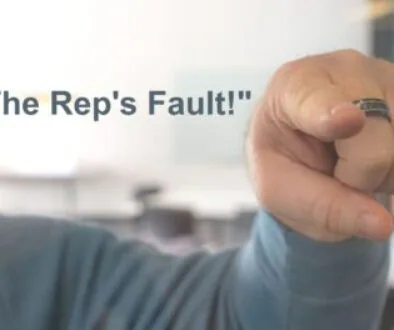A Stupid Medical Sales Question That Makes Your Competition Look Good
Sales reps know they should use questions during a sales call to identify needs and priorities as well as to control the flow of the conversation. Often though, sales reps ask questions that actually work against them.
I listened as Gary, a sales rep who hadn’t been hitting his numbers, asked a couple of common questions to a cardiologist. The conversation went something like this.
“Dr. Barnes, which coronary stent are you using during your PCI procedures?”
The doctor, obviously a man of little patience replied, “You already know the answer. You’ve asked me that before.”
“Right, you’re using the ABC stent as I recall. What do you like about it?”
The doctor, seemingly annoyed with the question answered. “What do I like about it? It works in almost all of my patients, I’ve been using it for five or six years, and I’m completely comfortable with it. Bob, the sales rep with ABC is one of the best reps I’ve ever worked with. He returns my phone calls within five minutes and he always has an immediate answer to my questions. He is easily the most knowledgeable sales rep I have ever met. Also, the value analysis committee at the hospital informed me that the ABC stent is the most cost-effective stent they stock, so I’m keeping the hospital happy when I use it.”
Gary asked the next overused and rarely productive question. “So Dr. Barnes, what don’t you like about the ABC stent?”
The doctor, now even more annoyed, replied, “Nothing that I can think of.”
It was as if Gary was oblivious to what Dr. Barnes had just said as he continued. “Great. Well I’m here to show you our new stent…” Gary launched into a one-sided 90 second speech that ended when Dr. Barnes interrupted, “Thanks for coming by. I’m going to stick with what I’m using.”
When Gary and I got back in the car, I did a quick debrief while the call was fresh in Gary’s mind. “Gary, what did Dr. Barnes spend the most time talking about during your conversation?”
Gary shrugged and meekly responded, “He told me about the product he was using.”
I prodded Gary to be more specific. “What did he tell you about the product?”
“He told me how much he liked it.”
I summarized, “Dr. Barnes used most of his words during your conversation to tell you what he liked about his current product and about his current sales rep. Why do you think he did that?”
Gary hesitated for a moment. “Well, I asked him to.”
My final question to get Gary thinking was, “How did that information help you in your sales effort?”
Gary just nodded reluctantly to acknowledge the point I was trying to make: his questions were not only useless, they were also counterproductive. Gary helped the doctor to sell himself that he had already made the right product choice!
Customers won’t switch to your product because they like the competitive product they’re using. They’ll switch when your product offers them something that their current product does not. So why waste time and reinforce a customer’s current product decision by asking him what he likes? Instead, first ask yourself this, “What does your product deliver to the customer or the patient that the customer’s current product does not, that both the customer and the patient would like to have?” The answer to this question should identify the topics to discuss and you can now formulate the right questions to create the discussion. The right discussion likely has little or nothing to do with what the customer likes about his current product.
It’s not your job to convince the customer to keep using the product or service that he’s using. Your job is to convince the customer that your product is a better choice and it’s hard to get there by asking him to sing the praises of your competition.


